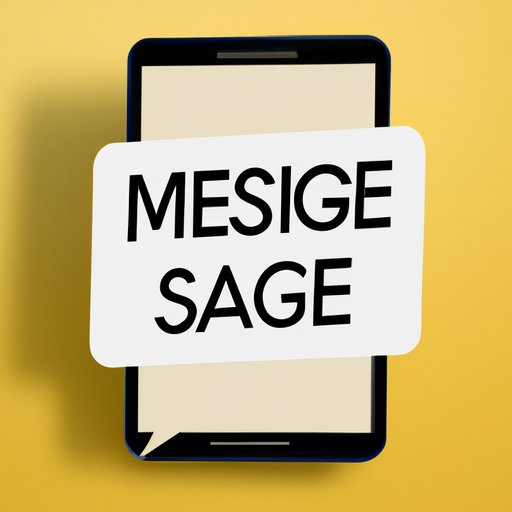Introduction
Sending a message should be a simple task, but we’ve all experienced the frustration of not being able to send a message when we need to. Whether it’s a message to a friend, colleague, or family member, it’s not a great feeling to see the “failed to send” notification. In this article, we will explore the most common reasons why messages might not send and show you solutions for each.
Troubleshooting Your Device
The first thing to check when your messages don’t send are the technical aspects of your device. There are several reasons why technical issues could prevent your message from sending, such as:
Weak Signal
Weak signals can cause problems when sending messages. If you are in an area with poor connectivity, try moving to an area with a stronger signal, or connect to Wi-Fi to send the message.
Outdated Software
Outdated software can sometimes cause messages not to send. Check for software updates on your device and messaging apps, and make sure to download them if available.
Storage Issues
Storage problems can also contribute to message sending issues. If your device is low on storage space, try clearing some space by deleting unwanted files or apps.
Carrier Issues
The second major issue to consider is carrier trouble. Your mobile network provider is responsible for the delivery of your message, and there are several factors that can affect this, such as:
Peak Hours
During peak hours, many people are using the network, making messaging slower and more difficult. Try sending your message during off-peak hours to avoid this problem.
Roaming
If you are traveling or at a location where you are roaming, message delivery may be delayed or impossible. Ensure that you are in a location with a strong enough signal.
Coverage Gaps
Coverage gaps can also prevent your messages from being delivered. This could be the result of being in an area with little or no cell coverage. Moving to a location where you can get coverage should help resolve the issue.
User Error
It’s important to ensure that you’re not making any common mistakes that might be preventing your messages from sending. Here are some of the most common mistakes that people make:
Sending to the Wrong Number
Ensure that the recipient’s phone number is entered correctly. Double-check the number before hitting send.
Airplane Mode
Make sure that airplane mode is off before sending a message. Turning it on can disable cellular and Wi-Fi connections, preventing your message from sending.
No Internet Connection
If you’re not connected to Wi-Fi or cellular data, you won’t be able to send any messages. Check your connection before sending your message.
App-Specific Issues
Some messaging apps can have their own limitations and quirks that can cause issues. Here are some of the most common issues with popular messaging apps:
WhatsApp requires a phone number to be linked for a message to be sent. Ensure that your contact’s phone number is correctly entered with the correct country code.
Facebook Messenger
The recipient may have privacy settings that prevent your message from sending. Ask the recipient to check their message request folder.
iMessage
Make sure that the recipient has iMessage turned on. If they do not have an iPhone, the message will not send via iMessage.
Security and Privacy Concerns
Sometimes sophisticated security measures can prevent your message from sending, and there may be recent security updates or privacy concerns that affect message sending. To mitigate these issues:
Check Security Settings
Ensure that your device has the right settings for sending messages and that any new security protocols or updates are applied.
Update Privacy Settings
Check your privacy settings to make sure that you are not blocked or restricted by the recipient’s privacy settings.
Service Downtime
Sometimes service downtime or maintenance can prevent messages from sending. Here are some things to try during downtime:
Wait
If the downtime is planned and scheduled, wait until the service is back up to send your message.
Use Alternative Methods
If you need to send an urgent message, try sending it through an alternative medium such as email or social media.
Cultural Differences
Finally, cultural differences can also impact message sending. Here are some things to consider:
Communication Style Differences
When messaging across different cultures, be aware of differences in communication style and etiquette so that misunderstandings can be avoided.
Language Barriers
Ensure that there are no language barriers, which can be a common problem when messaging across different cultures.
Conclusion
In conclusion, there are many reasons why messages may not send, and exploring the potential reasons and solutions is important. By troubleshooting your device, addressing carrier issues, avoiding user errors, dealing with app-specific issues, mitigating security and privacy concerns, preparing for service downtime, and being aware of cultural differences, you can improve the likelihood of messages being sent and received successfully. Give these solutions a try and get your messages successfully sent.
